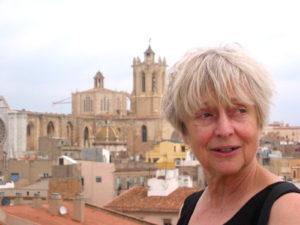 Married and with two children under two, Zane Kotker wrote her first novel on Tuesday and Friday mornings when the babysitter came.Bodies in Motion was accepted by Bob Gottlieb at Knopf, to be followed by A Certain Man and White Rising. When her husband, the writer Norman Kotker, was stricken with multiple sclerosis, she turned to nonfiction, sometimes writing under the name of Maggie Strong. She returned to fiction in the late 1990’s with Try to Remember, and soon began researching for The Inner Sea. Her novella Goodnight, Ladies appeared in 2016.
Married and with two children under two, Zane Kotker wrote her first novel on Tuesday and Friday mornings when the babysitter came.Bodies in Motion was accepted by Bob Gottlieb at Knopf, to be followed by A Certain Man and White Rising. When her husband, the writer Norman Kotker, was stricken with multiple sclerosis, she turned to nonfiction, sometimes writing under the name of Maggie Strong. She returned to fiction in the late 1990’s with Try to Remember, and soon began researching for The Inner Sea. Her novella Goodnight, Ladies appeared in 2016.
Her short stories have appeared in Alaska Quarterly Review, The Antioch Review and elsewhere. Using several of them as a base, she developed the stories of three women into a novella, Goodnight Ladies, She has received a fiction grant from the National Endowment for the Arts and a Must Read 2012 from the Massachusetts Center for the Book for her chapbook, Old Ladies in the Locker Room and Pool. She lives beside the Connecticut River, halfway between her childhood home in Vermont and the playground in Manhattan where she raised her kids.
Author of the month: Zane Kotker
By SUZANNE WILSON
The Chronicle
At a reading for her new book, “Goodnight, Ladies,” author Zane Kotker was approached by a woman who whispered in her ear, “Pru is my favorite.” At another book event, a reader told Kotker, “I have the same thoughts as Nikki.” And at a third gathering, a woman confided, “I’m most like Nikki, but I really would like to be Chessa.”
Pru. Nikki. Chessa.
The three women - all widows in their 70s who live alone - are fictional characters who seem to live and breathe, thanks to Kotker’s clear-eyed observations, smart humor, and close-to-the-bone prose.
It’s a book about aging, loss, solitude and change that speaks to readers, but never lectures.
We meet Pru as she ponders downsizing to a small condo in a retirement community that, as Pru puts it, has “just got Last Stop written all over it.”
We are introduced to Chessa, who has brought a shelter dog home to her now-empty house. Upstairs, looking at lights across the way, “she knew there were couples over there, sitting out on their patio extensions, drinks in hand, imagining their futures together. Well, she was having her future with a dog.”
And there is Nikki, now retired from her job at a local library’s First Call desk, who is thinking about time. “Every minute must count. Every minute must be golden. Ten years left? Fifteen? So few! ... I want. I want. More time? Not exactly. I want this time well spent. But how?” “Goodnight, Ladies” is a 111-page novella - a work of fiction that’s longer than a short story and shorter than a novel - that builds on several of Kotker’s previously published stories.
“The response has been very good,” she said, as she talked one recent morning in the study of her Northampton home.
Although she didn’t set out to write a book for aging baby boomers, Kotker said readers in that age group seem to connect strongly with it. She has found that among them, women and men tend to react in different ways.
“Men have told me they love it,” she said, “though some say it’s sad. I have not heard any women say that. I don’t think many men imagine themselves living alone, so that part of it feels sad and lonely to them.”
Women also feel sad about living alone, she said, “but then they adjust. So I think they just identify with it, they expect it for themselves.”
As she neared 70, Kotker began jotting down her thoughts and observations about daily life on little slips of paper.
She took note of snippets of conversations, such as friends’ comments about online dating, or downsizing. Over time, those slips of paper, those bits and pieces of conversations, and her earlier short stories grew into “Goodnight, Ladies.”
In the months since it was published in September by Off the Common Books of Amherst, the novella has earned high praise.
“I loved these Ladies,” wrote author Elinor Lipman, “and I thanked every chapter of this novella for its intelligence, its dry wit, its dilemmas and victories, and for beautiful sentences that shine without preening. Truly, a pleasure.”
The novella takes its place alongside Kotker’s five novels, numerous short stories, and a collection of poetry. She has also written non- fiction.
“Fiction is fun, and non-fiction is work,” she said, when asked which she prefers.
With fiction, she said, “you’re calling on everything you ever knew and on whatever pops into your head. You don’t know exactly where it will take you.” Non-fiction, on the other hand, “has to be correct, it has to be true. You write what you know, plus all the stuff you find out doing your research.”
Everything she writes invariably goes through multiple drafts – sometimes dozens – as she edits, rewrites and revises. “I write quickly, but then I throw out a lot of it,” she said.
Kotker used to share those many drafts with her husband, Norman Kotker, a writer who died in 1999. Their working relationship began as what she calls “the old model. He wrote the book and I typed it.”
After she started writing, the two of them developed their own shorthand for marking up each other’s drafts: B was for bored; C for confused; L for laughter; T for tears; and an exclamation point was praise for a great insight.
“He was a very good reader and a wonderful editor,” she said.
Her focus these days is less on building a career than it used to be, but it’s still all about the writing.
“I’m interested in getting things into their best shape and sending them out,” she said. “My husband used to say that writing a book is like making a shoe.” They are equal arts, both requiring craftsmanship and attention to detail. “You want to make a good shoe, the best shoe you can. That’s what matters the most.

Beautifully comic — Three smart women turn 70 in Zane Kotker’s new book
By TRISH CRAPO
For the Recorder
The three women in Zane Kotker’s novella, “Goodnight, Ladies,” coming out Sept. 7 from Off the Common Books of Amherst, are all turning 70. Their husbands have died, their children are grown, and Chessa, Nikki and Pru are adjusting to life alone with humor, frustration, a little sorrow, but mostly gutsy resilience.
These are smart ladies you’d like to know, who recite Latin conjugations to calm themselves during chemo or a root canal, drink wine by a crackling fire and discuss Jared Diamond’s “Collapse: How Societies Choose to Fail or Succeed” in their book club — but still know how to crack a ribald joke when the moment calls for it. They live in a university town Kotker conveys with a few deft strokes, allowing the reader to fill in the details. I filled the geography in with western Massachusetts places, but Kotker, who moved from Manhattan to Northampton in 1978, says not necessarily; it could be anywhere. The setting’s not as important as the characters, who jump to life within the first few lines of each of their sections. Built upon four short stories that Kotker published in journals, including Alaska Quarterly Review and Antioch Review, the novella is a series of short vignettes that manage to unfold quickly to convey larger worlds — both interior and exterior. Kotker is adept at conveying some of the dynamics of human interaction that, for better or worse, don’t change, regardless of how old we are.
Poet Cynthia Ozick called the book “sardonic, pathetic, witty, beautifully comic,” adjectives that could be applied to Kotker’s most recent book as well.
Kotker will be reading from “Goodnight, Ladies” at Broadside Books, 247 Main St., Northampton, Wednesday, September 7, at 7 p.m.
Other readings of “Goodnight, Ladies” will be at the South County Senior Center in Deerfield at 11 a.m., Sunday, Sept. 21, at Easthhampton Lathrop on Friday, Oct. 7, and at the Northampton Senior Center at 1:30 p.m., Tuesday, Dec. 6.
She is also going to read at house parties friends are organizing.
Kotker says she received an email from an old friend who wrote, “You’ve done the whole spectrum from hilarious to almost unbearably sad. And that she had many sort of ‘zaps’ of recognition.”
And while older women reading the book might see themselves, Kotker points out, “It’s also about people’s mothers.”
Kotker said she doesn’t think of the book as being sad.
“I think of it as human comedy,” she says. “I think of it as reality.”
“There are so many good things about being older,” Kotker says. “I wrote some of this (book) in my sixties, trying to get ready.”
“Is it fair to ask how old you are now?”
“No,” Kotker says with a smile.

